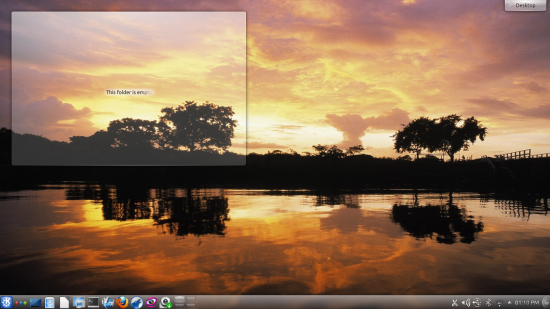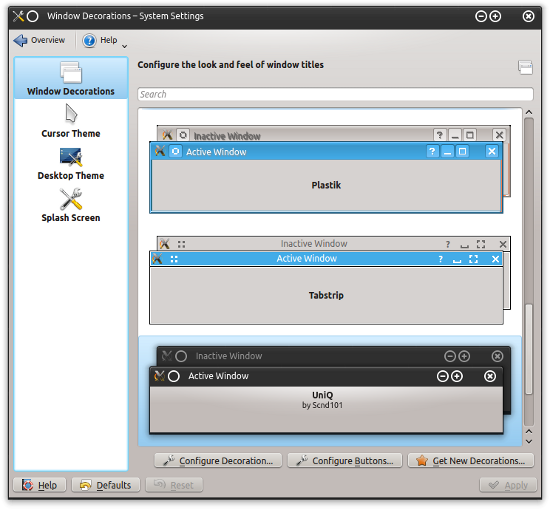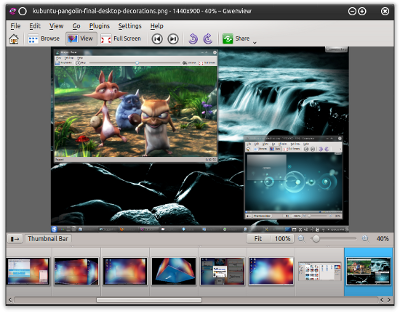Linux desktop environment showdown
December 21st, 2012 by Dedoimedo
Normally, at the end of the year, I do my usual Linux distro showdown. But I have never really done a proper desktop environment comparison, regardless of which operating systems run them, even though in the Linux world, quite often, it is hard to separate the two. Well, it seems to me, this is a great opportunity to give you a comprehensive head-to-head clash between the leading desktop environments that bless our distros. Before we begin, it is important to make a humble statement. There’s desktop environment, there’s desktop manager, and there’s window manager. Sometimes, the definition and distinction of… Continue Reading
KDE vs. Gnome system management
December 15th, 2012 by Dedoimedo
A few weeks back, we talked about KDE and Gnome in daily life, and how they fared from the applications perspective, when you pit programs developed for one environment against those created for the other. We learned a valuable lesson that technology and practicality do not necessarily go hand in hand, nor that you can easily draw a clear line between the two. Finally, we discovered the joy of freedom, in that you can mix software, regardless of whichever desktop you choose, and get the best of all worlds. Now, the big question is, does the same set of conclusions… Continue Reading
The State of gaming
November 27th, 2012 by Luis Augusto Fretes Cuevas
If you’ve been using Linux long enough there’s a phrase you’ve certainly read or heard in some forums, or discussions, or comments: I use Linux for everything, but I keep Windows for gaming. In fact, if you’re a gamer you’ve probably said this yourself. Because while Wine supports running many games, sometimes with even higher performance than doing it on Windows, which is a quite something, there are games that simply do not run under Wine. For example, you may like Gears of War and you may have even bought this game before installing Netrunner, perhaps before even knowing about… Continue Reading
If there are no clouds, can there be rain?
November 24th, 2012 by Dedoimedo
In other words, will you cry if you data ends up in some thunderstorm somewhere out there, aptly known as The Cloud. In this article, I want to show, present and debate the merits of using cloud-based technologies for enhancing your computer usage. And by enhancing, I mean, see whether this can really happen. We will discuss the e-cloud, what it means for the common user, how can one leverage their offline storage with online services, whether they are useful in practical daily scenarios, and what kind of precautions one might want to take to avoid deadlocking oneself by technology…. Continue Reading
KDE vs. Gnome in daily life
November 11th, 2012 by Dedoimedo
This is not a competition. The thing is, you can install any which program on any which distribution, pretty much, regardless of what desktop environment you choose to choose. Instead, this is a friendly reality check for people who prefer this or that operating system. Let’s say you wish to use only the native applications developed for your particular flavor of the desktop. How would your productivity or efficiency or peace of mind change then? We will pit Gnome programs vs. KDE software, across a range of categories. No browsers this time, since we did them only a few weeks ago,… Continue Reading
KDE Teatime Videopodcast updates!
November 9th, 2012 by Admin
Here are the latest additions to the series for anyone who missed them: Teatime#4 – KDE/Qt Browsers Teatime #5 – Proprietary Software Teatime #6 – UDS Conference KDE PIM Extra Enjoy watching!
Beyond Software: What Open Source can teach the world.
November 5th, 2012 by Luis Augusto Fretes Cuevas
Richard Stallman has many times argued that Open Source Software (OSS) merely refers to a model of software development, while Free Software refers to a social movement. I don’t tend to agree with Stallman, and I tend to side with the people that care about Open Source as an efficient way to develop software. But regardless of whether you think closed source software is immoral (as Stallman does) or not (like myself), there are things about how the (F)OSS community manages their projects that are not just efficient, or moral, but plainly and objectively superior to the way we handle… Continue Reading
Tutorial: Transferring files to your MTP-only Android device
October 31st, 2012 by Luis Augusto Fretes Cuevas
Chances are if you like Open Source and Linux you like Android, since it’s both Open Source and Linux. Quite ironically though many new Android devices, specially the very Open Source community friendly Nexus line, don’t support the USB Mass Storage Protocol, instead Android relies on MTP (Media Transfer Protocol), sadly it doesn’t quite work in Linux distros, although you may get MTP to work you’ll get transfer speeds of around 5 Kb/s or 17 minutes to transfer a 5 Mb MP3 (if you’re in this kind of situation, of either not being able to transfer anything or transfers taking… Continue Reading








